The best free Android apps of 2023: the best apps in the Google Play Store
The best free Android apps, tested and ranked
Sign up for breaking news, reviews, opinion, top tech deals, and more.
You are now subscribed
Your newsletter sign-up was successful
Our favorite free Android apps for making music, listening to music, finding podcasts and everything else to do with audio.
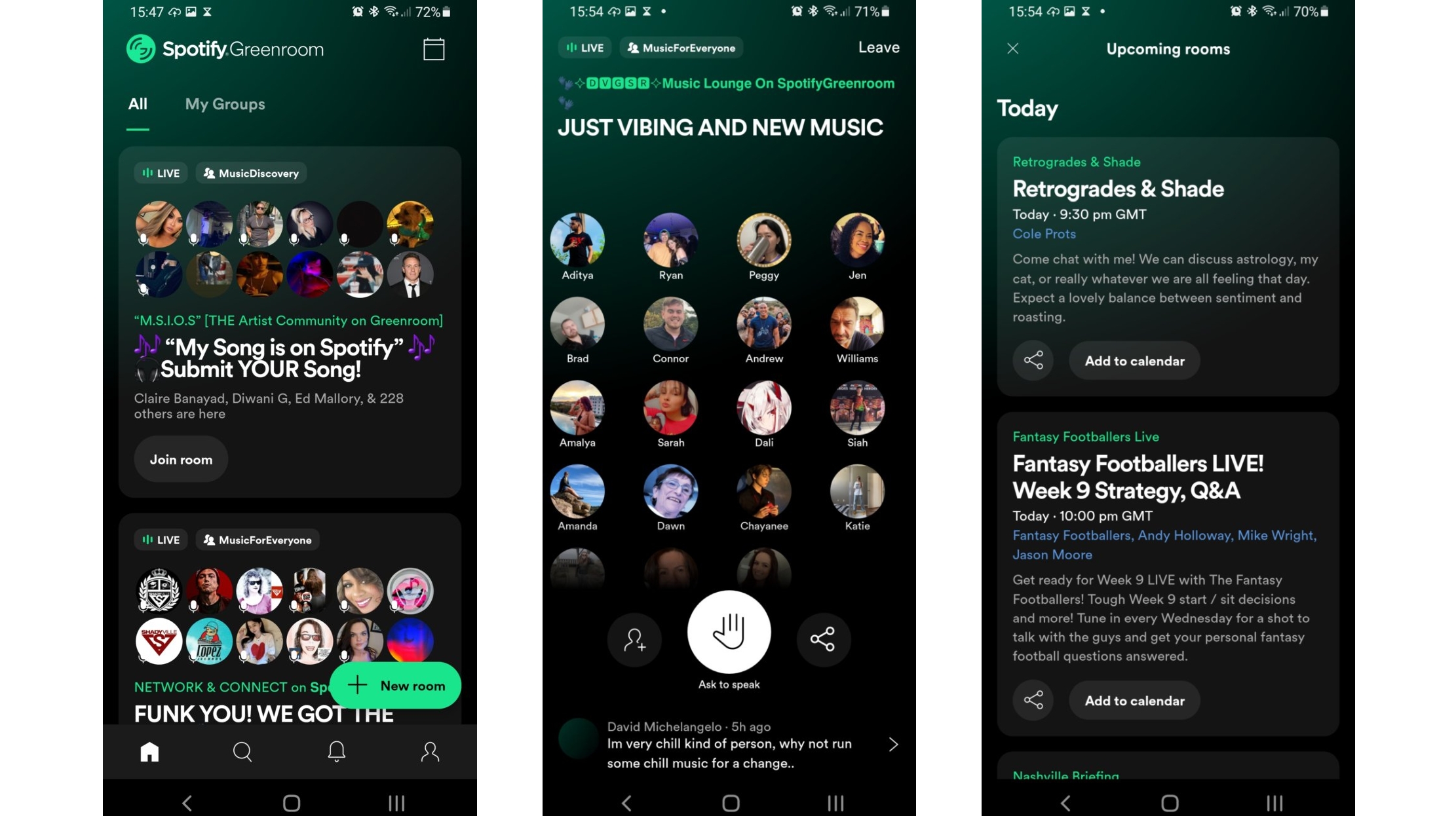
Spotify Greenroom
Why you can trust TechRadar
Spotify Greenroom is basically Spotify trying to get in on the Clubhouse action, so it’s an audio-based social network where you can join rooms and take part in conversations – or just listen, as if it’s a live podcast.
Being linked with Spotify there’s unsurprisingly a heavy music focus here, with many of the rooms being largely just a place where people listen to songs together, but there’s plenty of discussion too.
You can tell the app what sorts of things you’re interested in so it will surface the right rooms, and you can follow other users, create your own rooms, use text chat and more.
Live rooms can also be turned into podcasts for people to listen to later, so if you miss something live you won’t necessarily miss out.
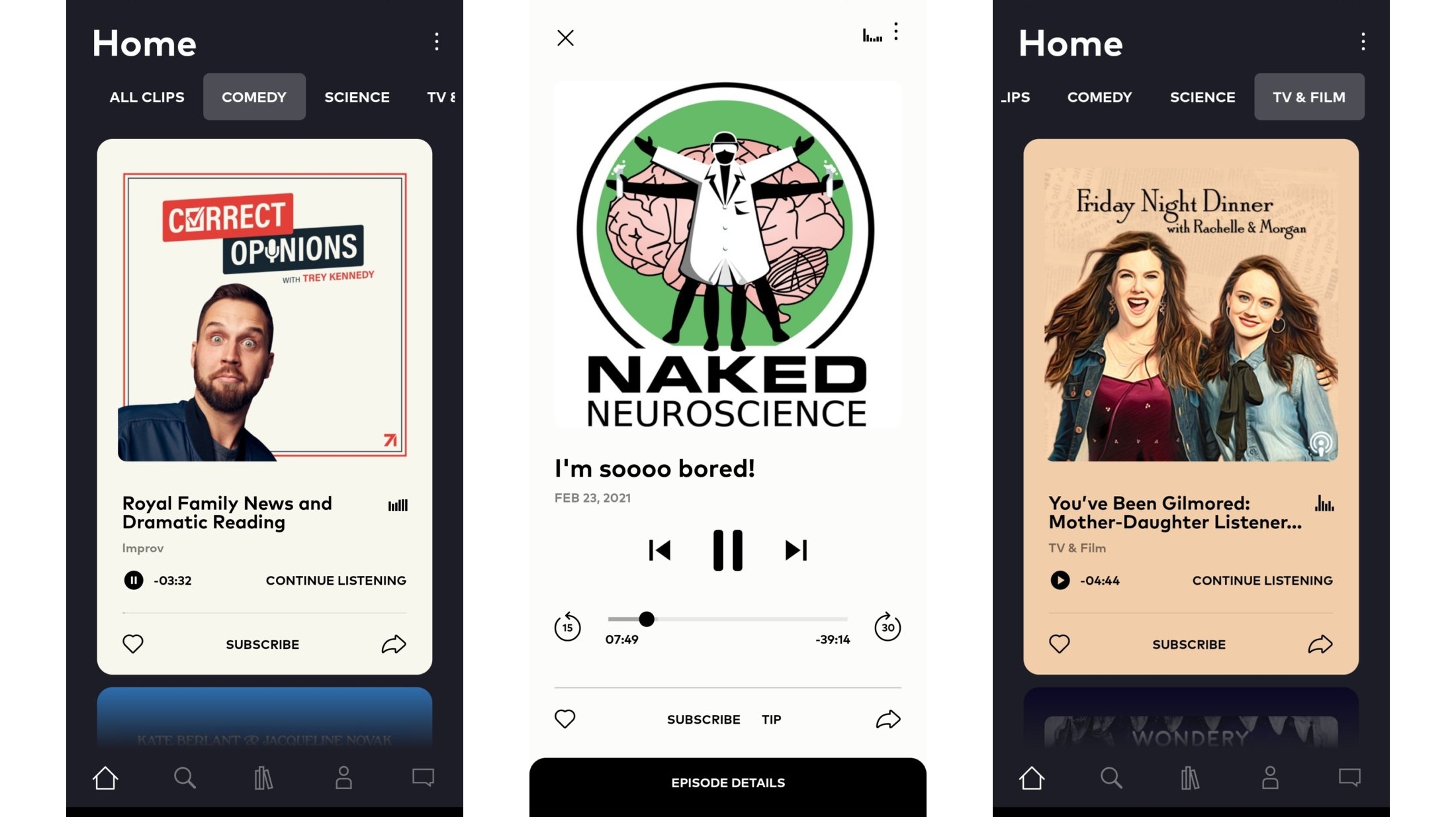
Moonbeam | Podcast Discovery
It seems like everyone has a podcast these days, which can make sifting through them all and finding ones you’re actually interested in a daunting prospect, but Moonbeam makes this a little easier.
This is a podcast discovery app which lets you swipe through a feed of podcast clips. Each clip is a curated ‘moment’ – usually two or three minutes long, and it will fit into a category that you’ve told the app you like, be that comedy, science or whatever else.
If you like what you hear you can tap through to listen to the whole episode or subscribe. If you don’t like it then a single swipe will take you to the next clip.
So you can use Moonbeam to listen to podcasts as well as discover them, but it’s not as full featured for that as some players. Still, it’s easy enough to add any discoveries to your subscriptions in your podcast player of choice, so Moonbeam could complement another podcast app admirably.
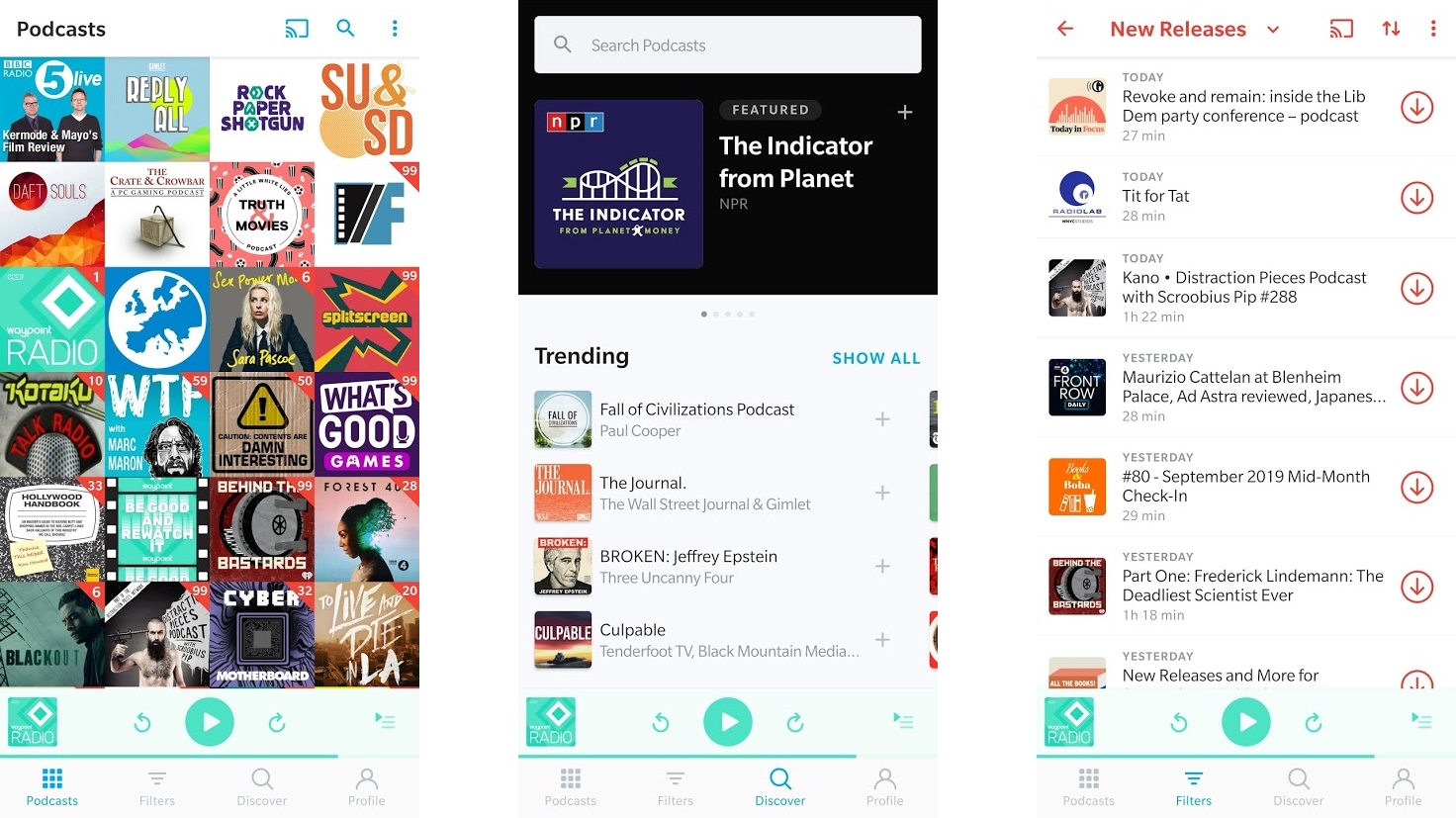
Pocket Casts
Pocket Casts has long been one of our very favorite podcast players, but it was also a premium app. Now though, the Android app has gone free, making it a candidate for this list for the first time.
Despite the app now being free, you won’t have to put up with adverts or limited features – everything people paid for in the past is still here, along with the promise of future updates.
Features include variable speed playback, the option to boost the volume of voices, trim silent sections, control playback from a Wear OS watch, and a whole lot more, all wrapped up in an intuitive interface that makes finding and subscribing to podcasts a breeze.
There’s also a new subscription option called Pocket Casts Plus, which adds desktop apps, new themes and the ability to upload audio files to Pocket Casts, but for most people the free version will be plenty.
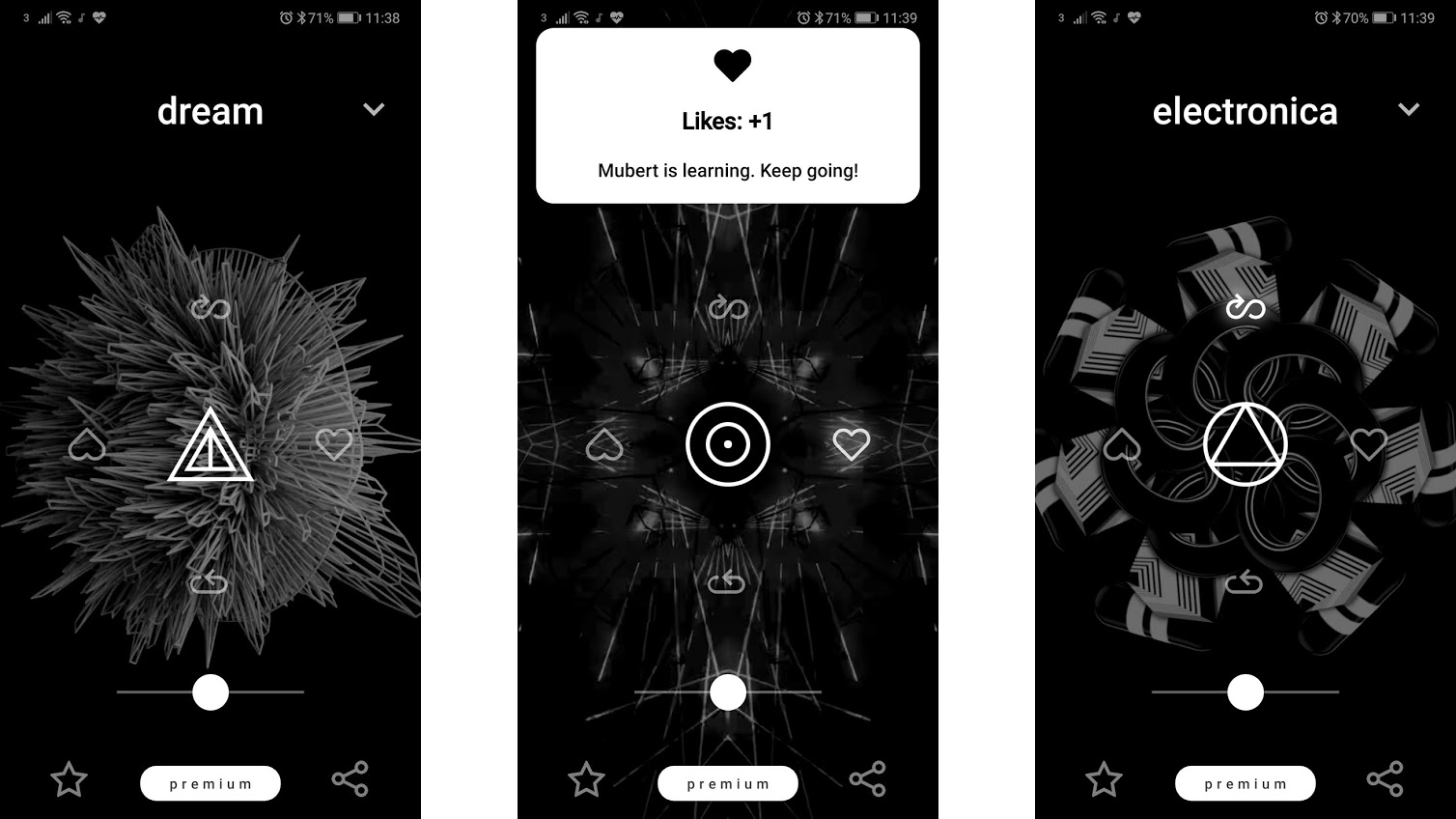
Mubert
Want to listen to music that no one else has heard? With Mubert you can. It uses AI paired with a sample database to generate music to fit various genres and situations. So whether you’re working or trying to sleep, it will create something suitable.
You can also tell Mubert if you particularly like or dislike the music it generates, and it will learn from that, so over time the music it generates becomes more personalized to your tastes.
Anything you want to be able to listen to again you can favorite, but otherwise you’ll be getting a new soundscape every time you load up the app or a stream.
The core features are free, but for $6.99/£8.99 per month (with discounts available for paying yearly) you can get access to a larger and ever-expanding sample base, along with other features, such as the ability to change the intensity of the music. That’s a high price when the core features are free, but could be worth it if you get a lot of use out of the app.
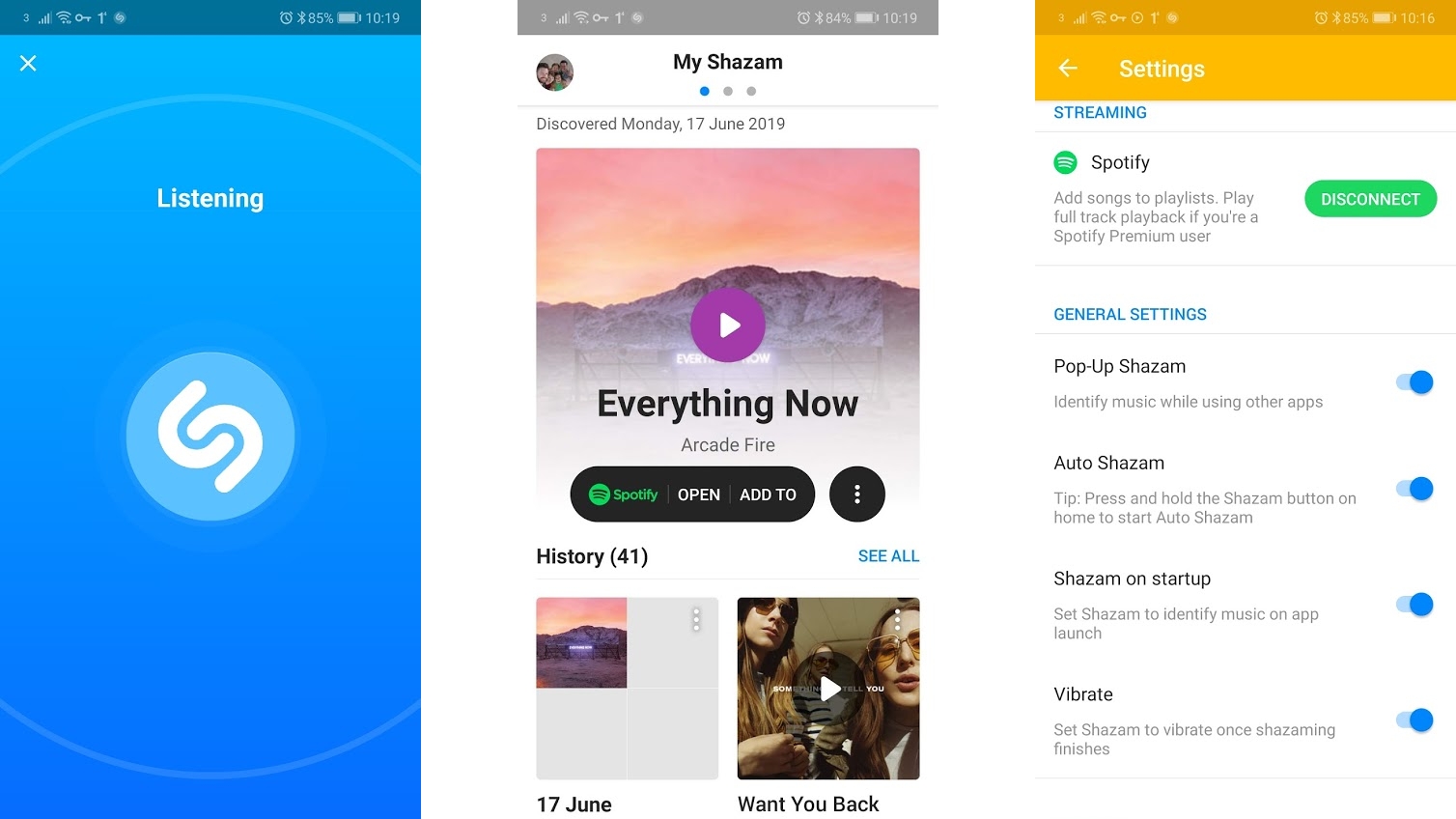
Shazam
Shazam is far from new, and chances are you already know about it, but it’s worth highlighting as it has been improved over the years.
But first, if you don’t know what it is: Shazam can identify music by listening through your phone’s speaker.
Originally this involved launching the Shazam app and tapping a big button on its main screen, but since launch the developer has added an ‘Auto Shazam’ feature, which allows Shazam to listen for music al all times.
If you don’t want it quite that ever-present then you can instead simply set it to start listening the second you launch the app, so you don’t have to tap any additional buttons.
And most recently ‘Pop-Up Shazam’ was added, which lets you identify music when using other apps without having to jump back to the main Shazam app.
Shazam can now identify music that’s played through headphones on your handset, and can even go beyond music, using visual recognition to identify posters, books and more.
There’s also Wear OS support, and once you’ve identified a track you can access it on Spotify or Apple Music with a link from Shazam.
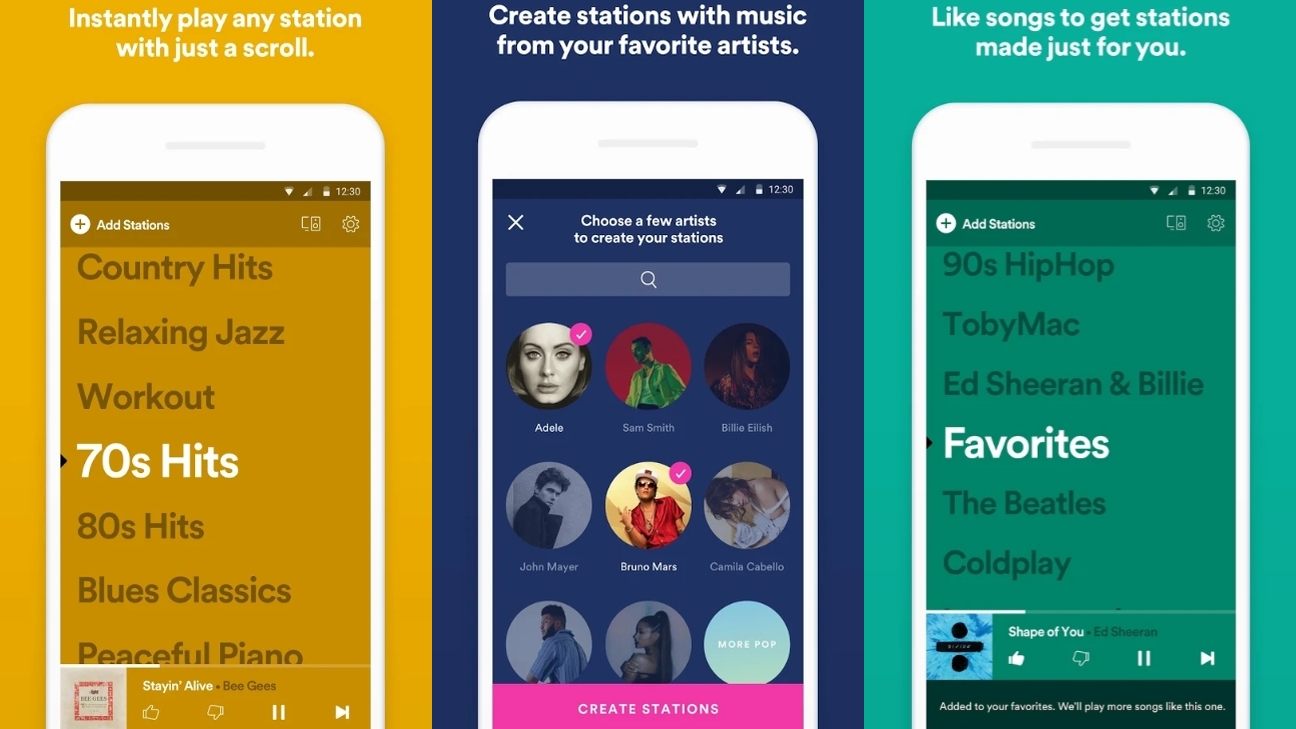
Spotify Stations
Spotify Stations is a more streamlined alternative to the main Spotify app, but before we get ahead of ourselves, it’s worth noting that at the time of writing this one is just for those in the US or Australia (though we imagine it will launch more widely over time).
With that caveat out the way – Spotify Stations lets you listen to playlists (or ‘Stations’), rather than selecting specific songs or albums.
These stations might focus on a genre, or a mood or activity. For example you could get a ‘Relaxing jazz’ station, or a ‘Workout’ one. You can also create stations based around a selection of musicians that you like.
But mostly Spotify Stations seems to be aimed at getting you listening faster, without any typing or searching, and helping you discover new music, something which it gets better at over time, as it learns what sorts of things you like.
A lot of this stuff is in the main Spotify app too, but here it’s front and center, without any distractions.
You need a Spotify account to use Stations, but you don’t need to be a paying member. However, if you are, you’ll be able to skip an unlimited number of tracks, and won’t have to put up with adverts.
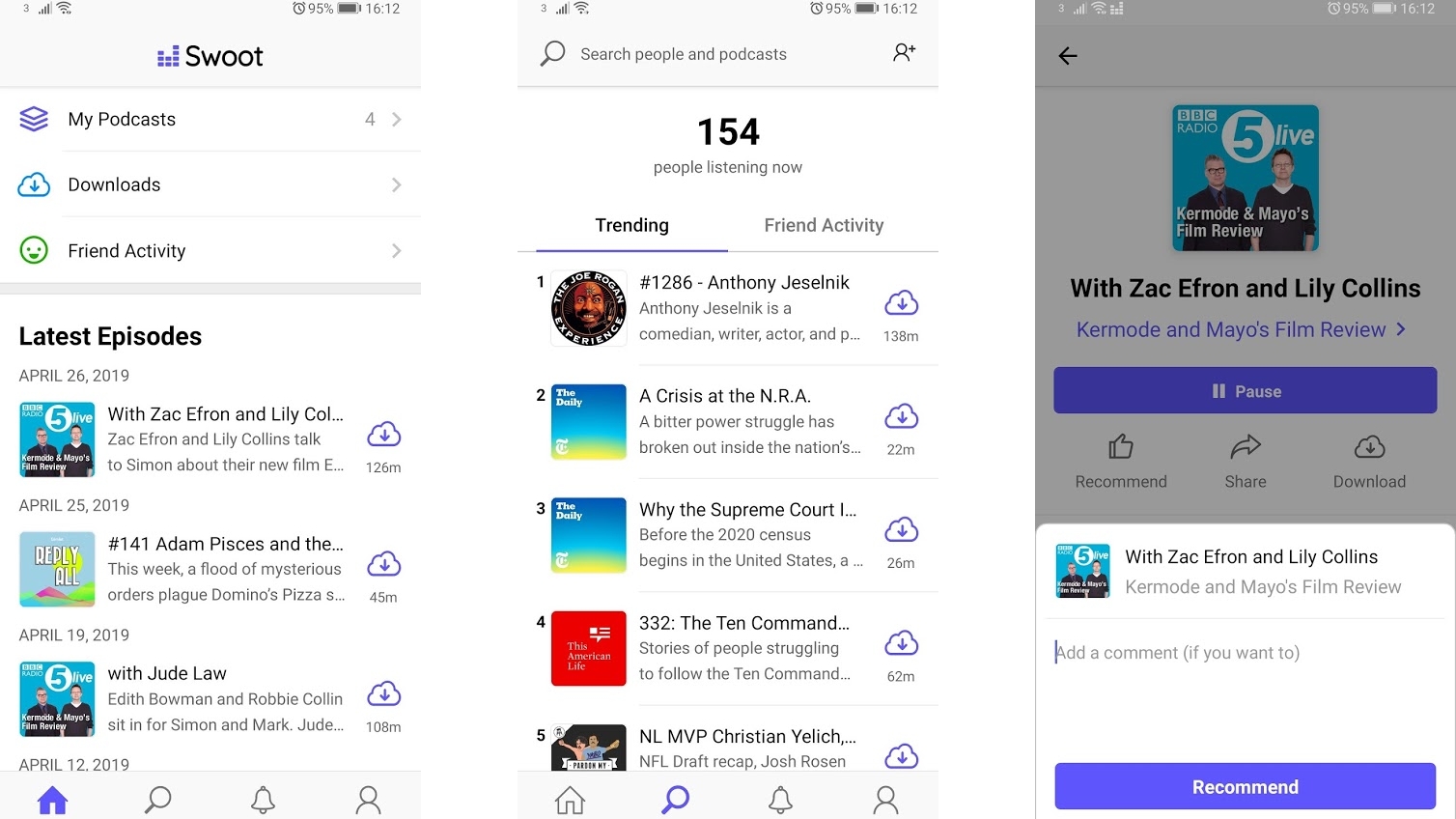
Swoot
Swoot aims to make podcasts social, by sharing what you’re listening to with any friends who also use the app.
This is primarily useful to help you find new podcasts to listen to, especially as there’s also a recommendation feature, which lets you actively recommend a podcast to friends in the app (optionally adding text to explain why you recommend it).
Swoot also has a ‘Trending’ tab, so you can see what’s popular with people who aren’t on your friends list, and beyond all that it’s a basic but competent podcast player, letting you subscribe to podcasts, download episodes so you can listen offline, and change the playback speed.
The interface could use some work – it’s fine but a bit bland in appearance, but otherwise this is a great app if you have friends who are as into podcasts as you.
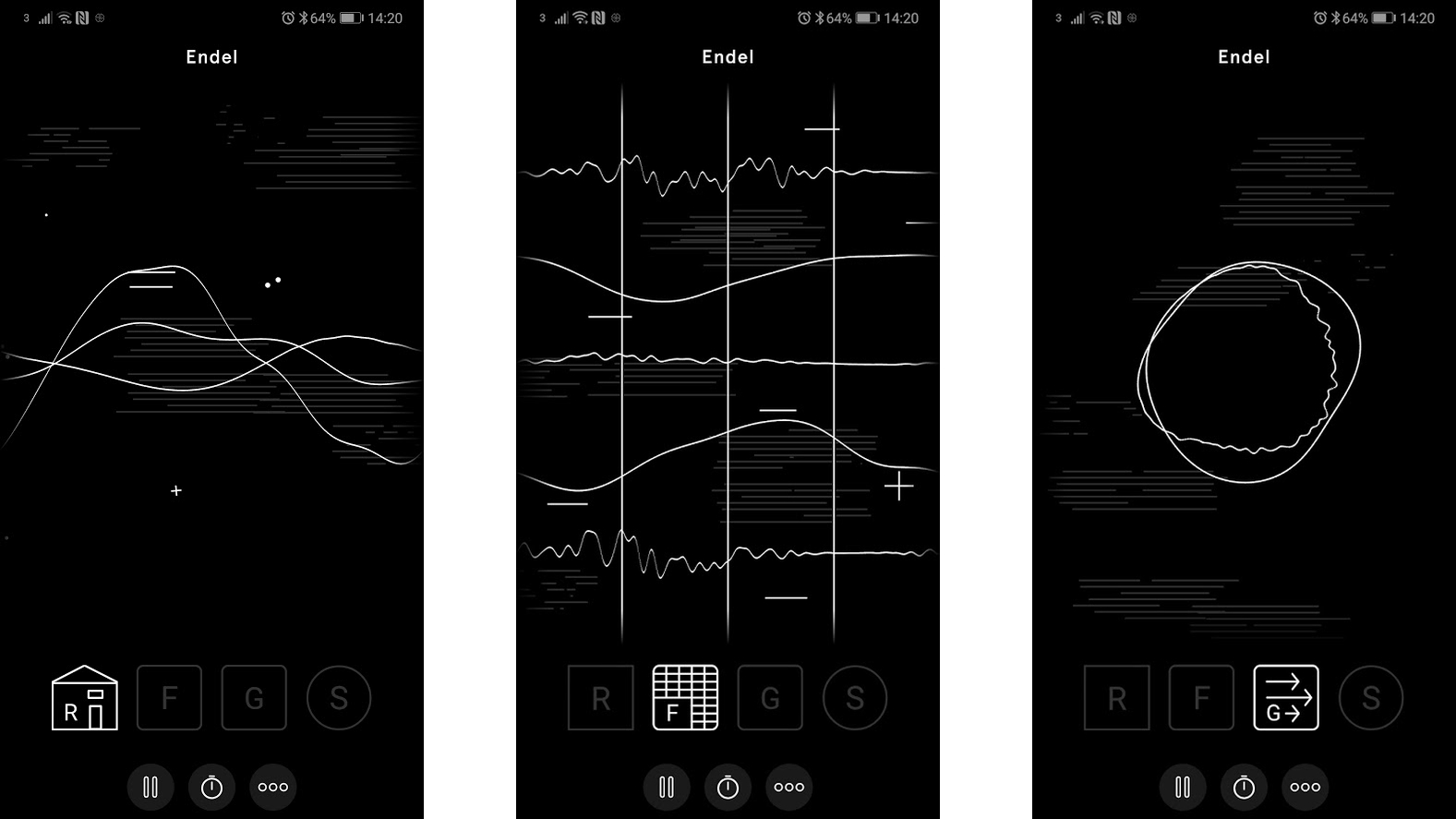
Endel
Endel creates soundscapes to help you relax, help you focus, help you sleep or for when you’re on the go.
Unlike some apps such as TaoMix 2 you can’t customize the sounds, but what Endel can do is access time, location and weather data, and even your heart rate if you have a monitor and give it access to your health data, and it uses this information to tailor the soundscapes to your current situation.
Beyond picking a mode you can also set a timer if you want it to shut off after a certain amount of time, but that’s about all. This is a simple, stripped back app on the surface, that’s doing lots behind the scenes to ensure it’s properly personalized.
It’s also an attractive, easy to navigate app, so whether you want something to drown out the background noise, bring on sleep or motivate you to keep moving, Endel could be a good choice.
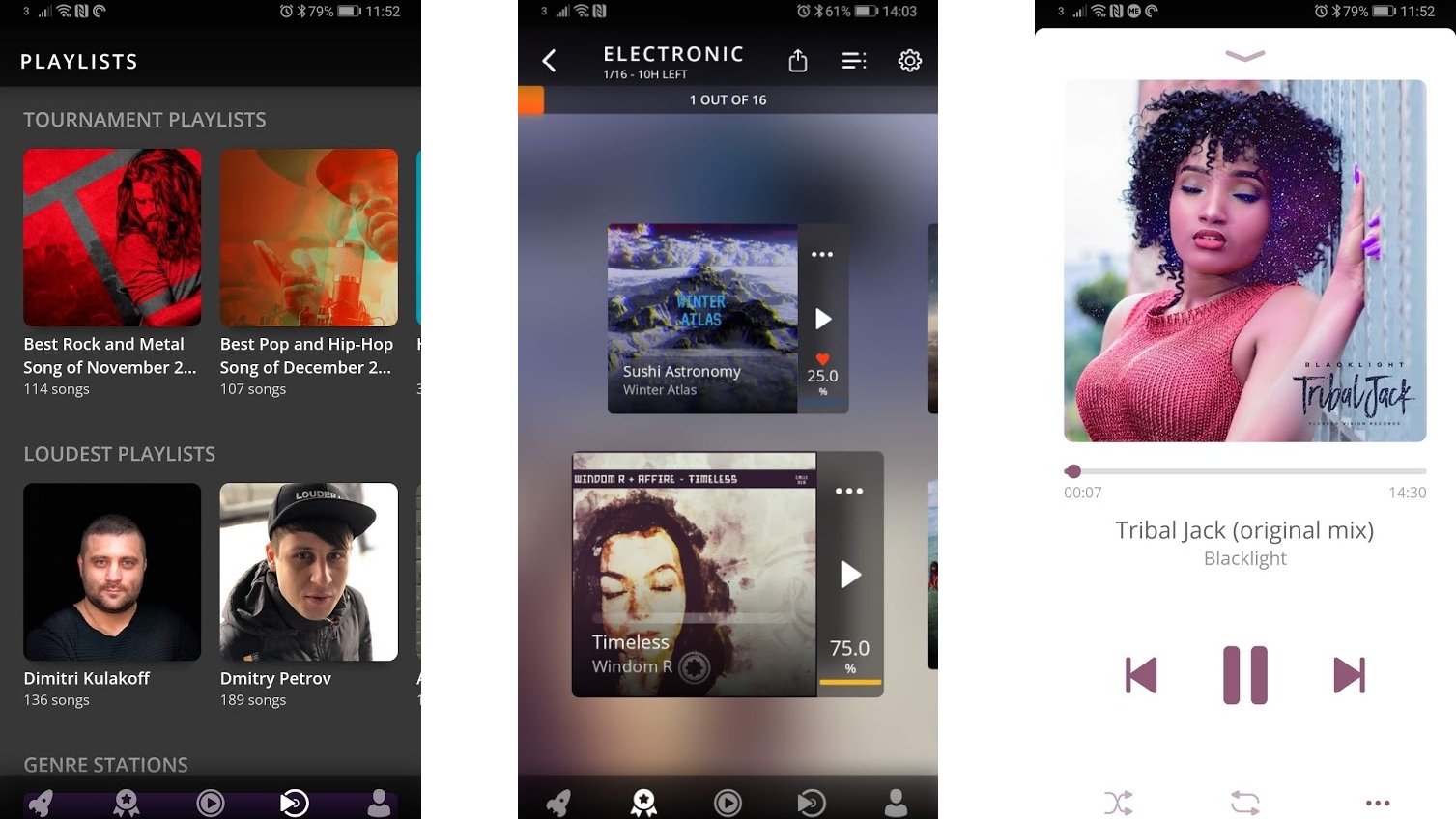
Louder.me
Louder.me aims to both help listeners discover new independent music, and musicians get their music out there – and maybe even win cash prizes in the process.
As a listener, you can hear samples of independent songs in the arcade section of the app. If you like what you hear you can heart it and there’s also the option to listen to the full track or add it to a playlist.
But the tournament section is perhaps the most interesting part of Louder.me. This pits the 64 songs with the highest rating in arcade mode against each other.
It pairs them up – so there are 32 pairs of songs - and lets you listen to samples (or the whole song if you’d prefer) and then say which of each pair you preferred. Over a number of rounds and eliminations a winner is ultimately declared, winning $1,000. Of course, even the losers get extra exposure this way.
As a musician you have to use the website to upload your tracks to Louder.me – that functionality isn’t offered in the app, but as a listener the app somewhat gamifies the listening experience, making for a fun twist on music discovery.
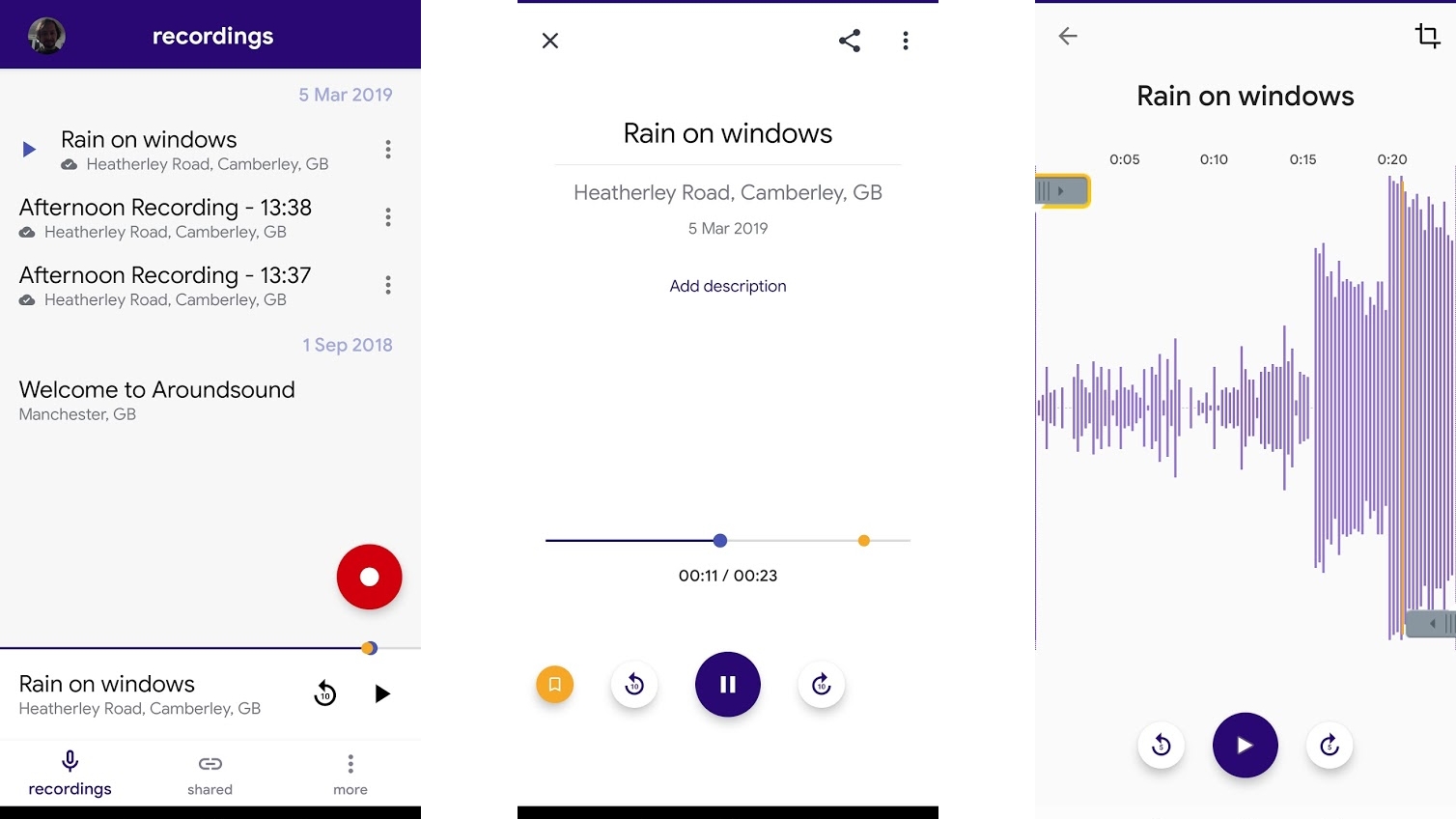
Aroundsound Audio Recorder
Aroundsound Audio Recorder is a seemingly simple audio recording app with a surprising amount to it.
It’s designed to allow you to quickly and easily record any sound with a single tap - be it a conversation, the wind in the trees, or anything else.
Recordings are saved automatically, named based on the time of day, and given a location tag. Tapping on a recording then plays it back. Simple.
You can also adjust the recording quality, pause a recording and continue the same recording later, trim a recording or edit out unimportant parts, and share recordings with people or apps as a web link, so there’s no need for others to have the Aroundsound app or to download a file in order to listen to your recordings.
You can also change the names of your recordings and add bookmarks to important points in them, so you can easily find the key parts later. These bookmarks can even have a note attached. Plus, you can back up your recordings to the cloud, so they’ll never get lost.
There’s a lot here, but most of its stays out of the way, so if you want to stick to the basics you won’t find endless buttons and toggles intruding on the experience.
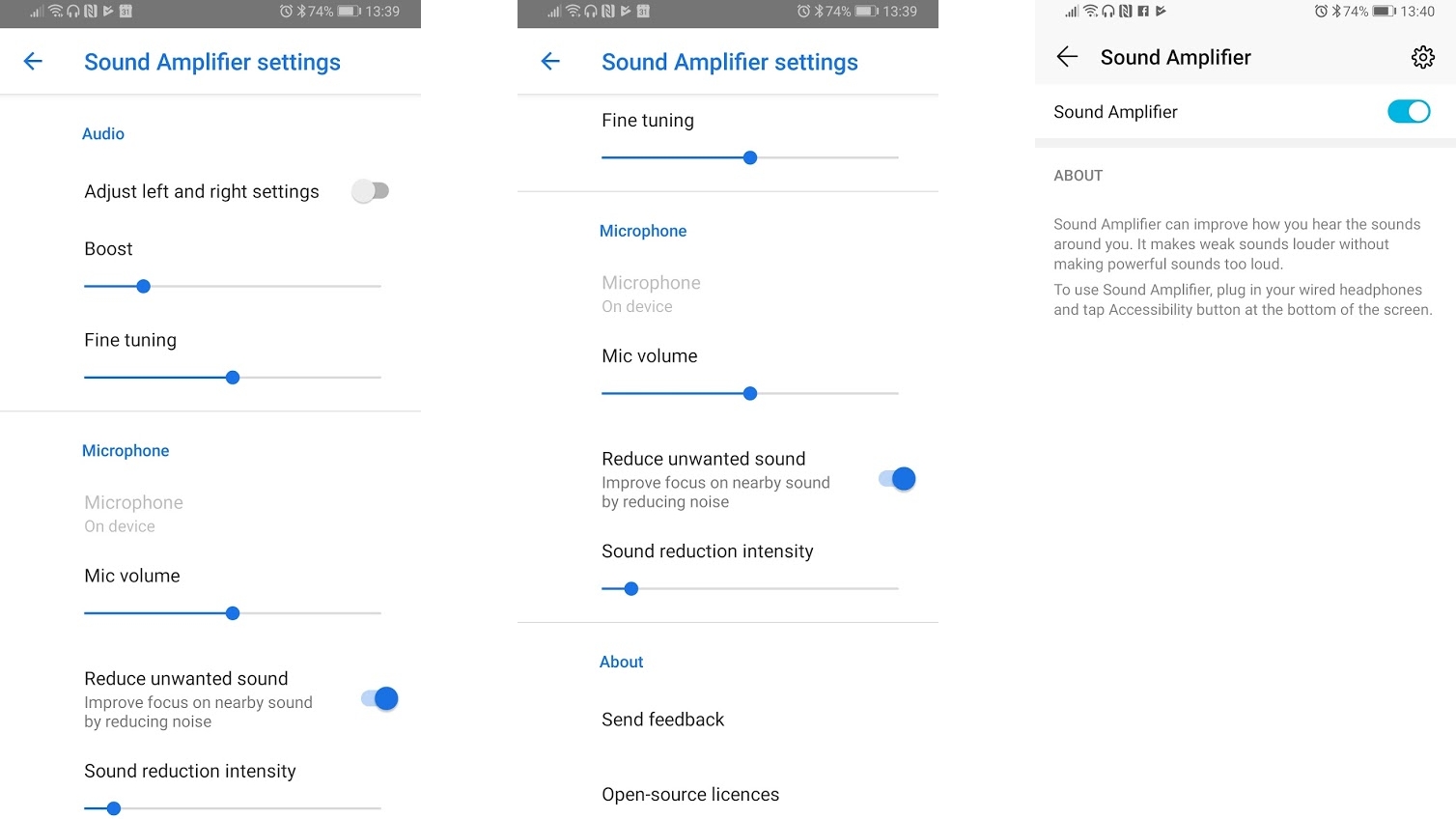
Sound Amplifier
Sound Amplifier is an app from Google designed to enhance audio when using headphones. Well, we say an app, but it won’t appear in your app drawer and you can’t launch it as such. Instead, you’ll find it in the Accessibility section of your phone’s main settings screen, and only when wired headphones are connected.
Once there, you can reduce unwanted sounds, adjust the mic volume and boost or fine tune the audio from one or both sides of your headphones.
The primary purposes of the app are to make sound clearer by increasing quiet sounds without over-boosting loud sounds, and to reduce background noise so you can better focus on the audio.
It did a fairly good job in our tests, but there’s one major issue, namely the need for wired headphones. This of course is a problem for anyone who prefers to go wireless, and even more of a problem on the ever-growing number of phones that lack a 3.5mm headphone port.
The app also seems as though it could really benefit those with hearing issues, yet many such people use wireless hearing aids, which won’t be compatible with it. Hopefully Google will drop the need for wires before too long.
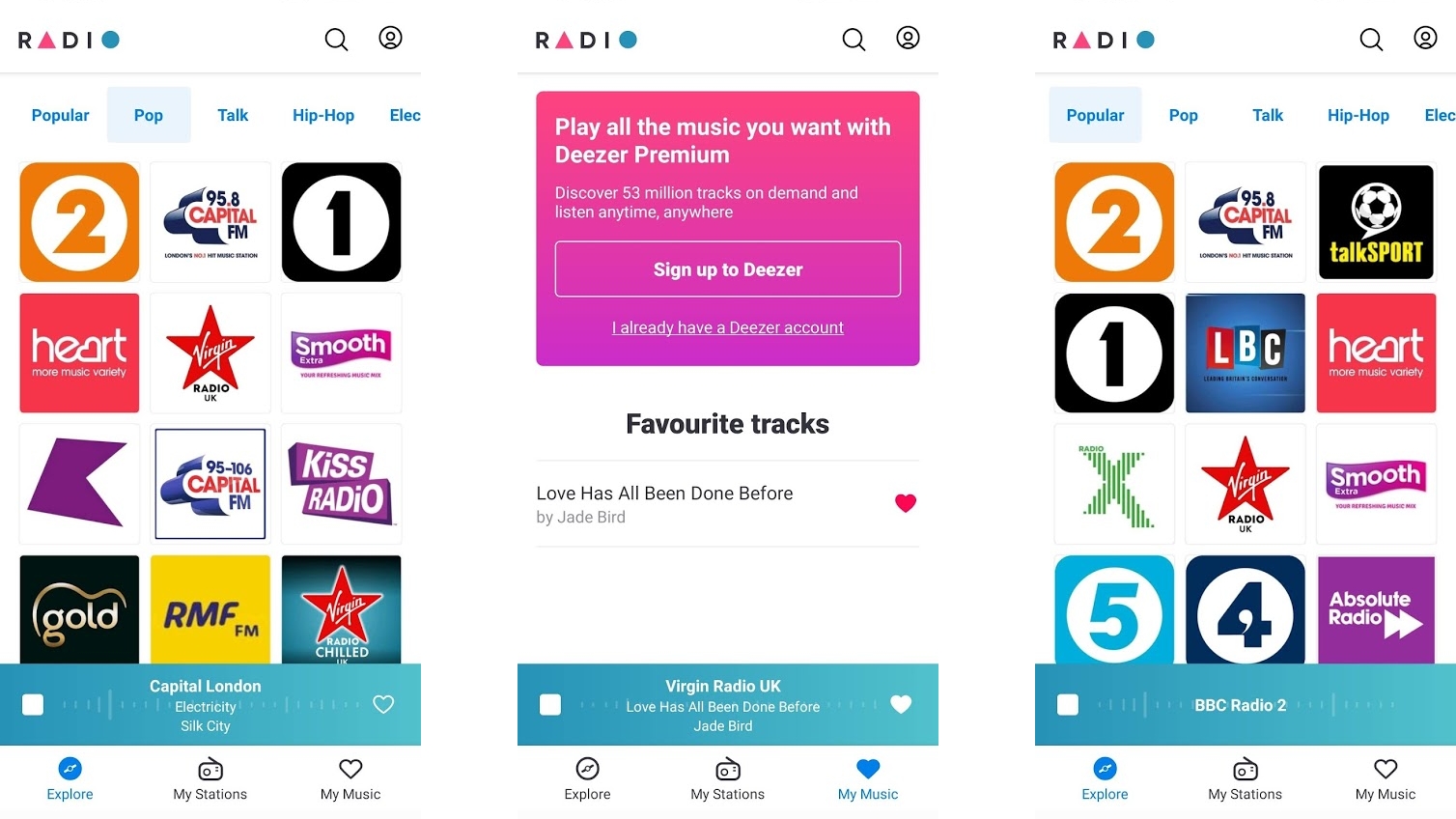
Radio by Deezer
Radio by Deezer is a slick if slightly basic radio player app, and although it comes from Deezer (a company known primarily for its Spotify-like subscription service) it’s free to use.
The app has around 30,000 FM and online radio stations sorted into various categories, such as ‘pop’ and ‘rock’. So you can browse them that way, or search for a specific station.
Stations that you recently played or play the most often will be added to lists on the ‘My Stations’ tab, though in a weird omission there’s no way to manually add stations to your favorites.
You can however favorite songs that are being played, but unless you have a Deezer subscription this will just show you a list of them, rather than actually letting you listen to them again.
It’s an app that needs work, but it looks good, is easy to navigate and makes for a great companion to the main Deezer service.
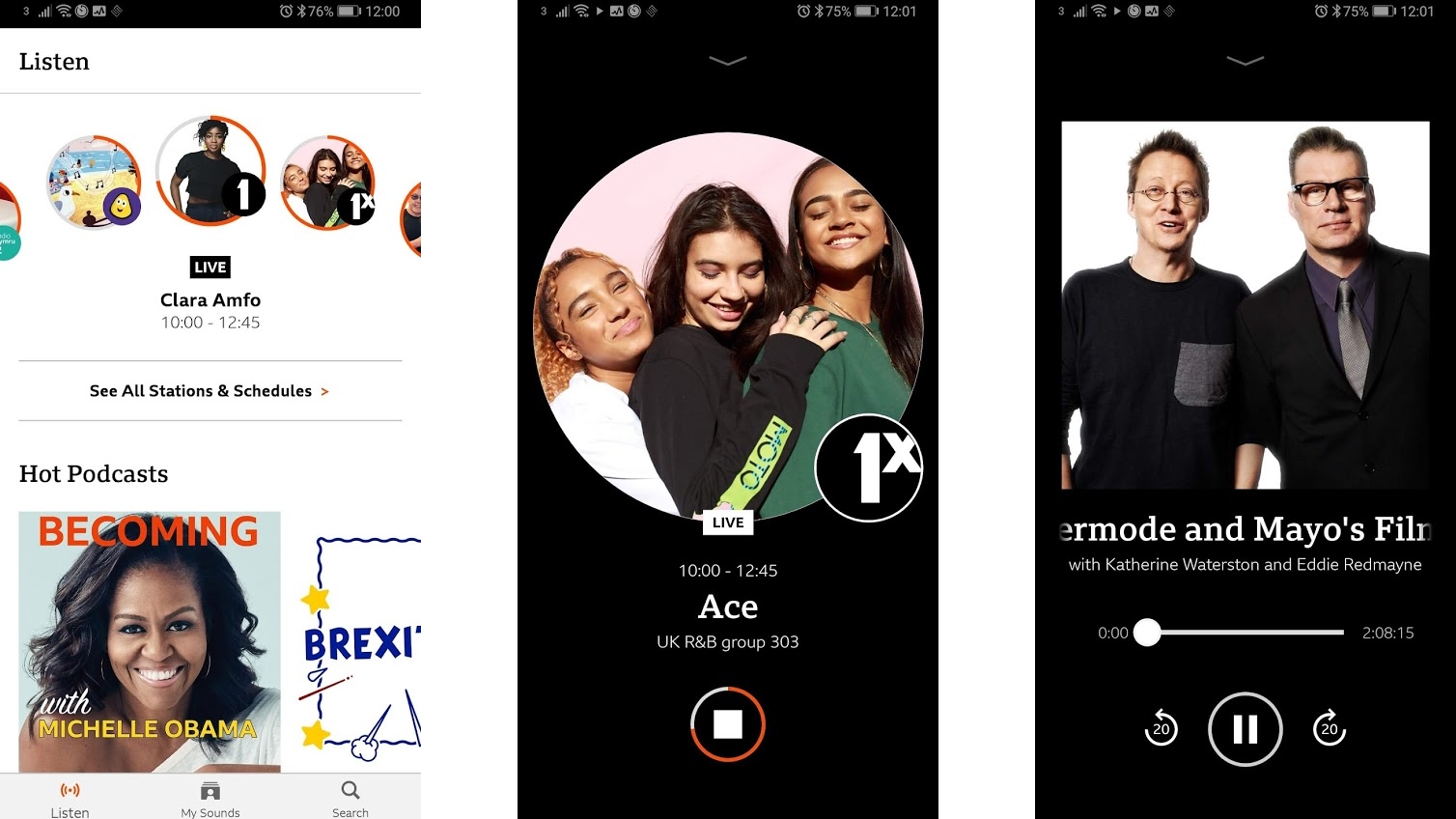
BBC Sounds
BBC Sounds brings all of the BBC’s live radio content and podcasts to one app, so you can listen live on your phone, and subscribe to and stream podcasts.
BBC Sounds also lets you pick up where you left off on another device, so if you get halfway through a podcast on your phone, you’ll be able to start from that point on your tablet automatically. It can also recommend content based on what you’ve been listening to, so it’s a good way to discover new things.
It’s basically iPlayer for radio (in fact the plan is for it to ultimately replace BBC iPlayer Radio) and if you listen to a lot of BBC content it’s arguably a smarter, better choice than listening on a radio or using another podcast app.
At the moment the BBC Sounds app is UK-only, but given that the iPlayer Radio app is available globally we wouldn’t be surprised if BBC Sounds is one day too.
Current page: The best free music and audio apps for Android
Prev Page The best free health, food and exercise apps for Android Next Page The best free office and writing apps for AndroidSign up for breaking news, reviews, opinion, top tech deals, and more.
James is a freelance phones, tablets and wearables writer and sub-editor at TechRadar. He has a love for everything ‘smart’, from watches to lights, and can often be found arguing with AI assistants or drowning in the latest apps. James also contributes to 3G.co.uk, 4G.co.uk and 5G.co.uk and has written for T3, Digital Camera World, Clarity Media and others, with work on the web, in print and on TV.